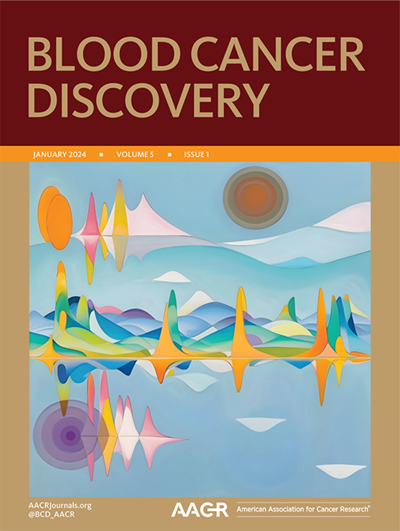CD33-CD123 IF-THEN Gating Reduces Toxicity while Enhancing the Specificity and Memory Phenotype of AML-Targeting CAR-T Cells.
IF 11.5
Q1 HEMATOLOGY
引用次数: 0
Abstract
Significance: Our study demonstrates the use of "IF-THEN" SynNotch-gated CAR-T cells targeting CD33 and CD123 in AML reduces off-tumor toxicity. This strategy enhances T-cell phenotype, improves expansion, preserves HSPCs, and mitigates cytokine release syndrome-addressing critical limitations of existing AML CAR-T therapies.
CD33-CD123 IF-THEN门控降低毒性,同时增强aml靶向CAR-T细胞的特异性和记忆表型。
CAR - t细胞疗法在治疗淋巴细胞白血病方面取得了显著成功。然而,由于对造血干细胞和祖细胞(HSPC)的靶向非肿瘤毒性风险以及t细胞的持久性和寿命不足,其在AML中的成功仍然难以捉摸。使用SynNotch电路,我们生成了针对CD33和CD123 AML抗原组合的高精度“IF-THEN”门控逻辑电路,并证明了对AML细胞系和患者来源的异种移植物的抗肿瘤效果。与组成型表达的CD123 CAR-T细胞不同,通过CD33 SynNotch通路表达的CAR-T细胞可以保存HSPCs并降低靶向非肿瘤造血毒性的风险。这些门控CAR-T细胞表现出较低的衰竭标志物(PD1、Tim3、LAG3和CD39)表达,较高的记忆T细胞(CD62L+CD45RA+)频率,并且扩增增强。在靶向AML的同时,被调节的电路CAR信号也有助于减轻细胞因子释放综合征,潜在地解决了CAR- t免疫治疗中持续存在的挑战之一。
本文章由计算机程序翻译,如有差异,请以英文原文为准。
求助全文
约1分钟内获得全文
求助全文
来源期刊

Blood Cancer Discovery
Multiple-
CiteScore
12.70
自引率
1.80%
发文量
139
期刊介绍:
The journal Blood Cancer Discovery publishes high-quality Research Articles and Briefs that focus on major advances in basic, translational, and clinical research of leukemia, lymphoma, myeloma, and associated diseases. The topics covered include molecular and cellular features of pathogenesis, therapy response and relapse, transcriptional circuits, stem cells, differentiation, microenvironment, metabolism, immunity, mutagenesis, and clonal evolution. These subjects are investigated in both animal disease models and high-dimensional clinical data landscapes.
The journal also welcomes submissions on new pharmacological, biological, and living cell therapies, as well as new diagnostic tools. They are interested in prognostic, diagnostic, and pharmacodynamic biomarkers, and computational and machine learning approaches to personalized medicine. The scope of submissions ranges from preclinical proof of concept to clinical trials and real-world evidence.
Blood Cancer Discovery serves as a forum for diverse ideas that shape future research directions in hematooncology. In addition to Research Articles and Briefs, the journal also publishes Reviews, Perspectives, and Commentaries on topics of broad interest in the field.
 求助内容:
求助内容: 应助结果提醒方式:
应助结果提醒方式:


